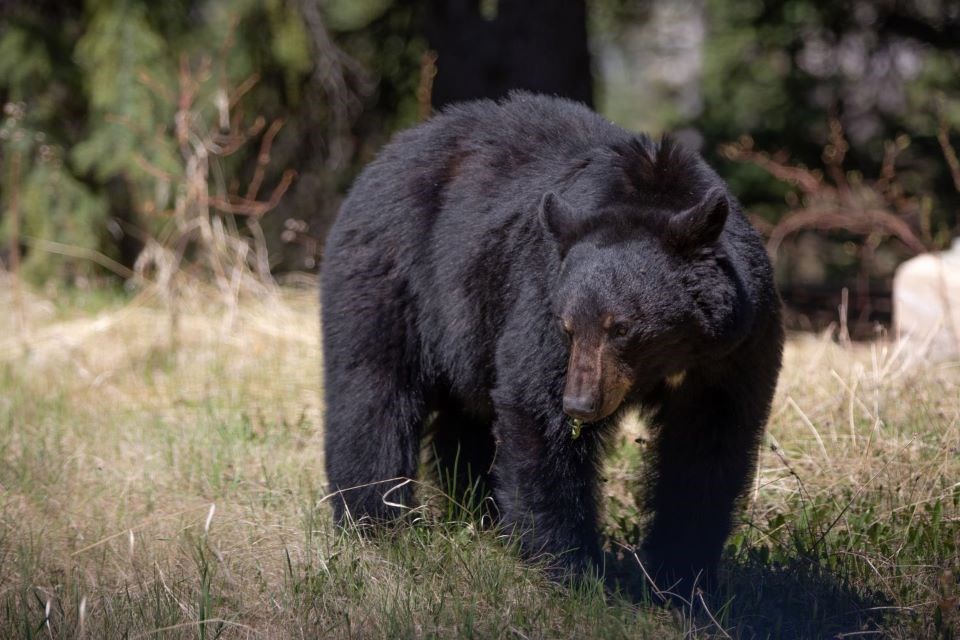Jasper National Park has confirmed that the first black bear sighting occurred locally on Tuesday, April 2 in the area between Old Fort Point and Jasper Park.
This report is on par with the first sighting last year, which occurred on March 31, 2023.
“Spring brings important changes to the landscape and to wildlife behaviour in the park, particularly around the Jasper townsite,” Parks Canada stated in a press notice sent to the Fitzhugh on April 3.
“Bears have started to emerge from their dens with at least one black bear spotted in the valley bottom, with more expected to awaken soon. It’s time to brush up on wildlife safety tips, add bear spray back into your adventure kit and be ready to encounter wildlife.”
“We’ve heard a couple other reports of people seeing bear scat east of town between the tracks and the highway, and also up on Pyramid Bench,” added James McCormick, human wildlife conflict supervisor with Parks Canada.
Jasper National Park is home to both grizzlies and black bears. Grizzlies den higher up, however, so they still have to work through the snowpack as they descend.
“They are sometimes [taking] a little bit longer to get down to the valley bottom, depending on where they’ve denned,” McCormick said.
“We can expect to start seeing them at some point.”
Although the chances of having an encounter with an aggressive bear are low, it is always important to plan your visit to the outdoors properly to help reduce the risk even further.
Anytime you are out in nature, it is a good idea to carry bear spray and know how to use it.
“When getting that bear spray out again, you still need to keep it warm,” McCormick said.
“You don't want to leave that outside if you can. You don’t want it to freeze if you can help it because it's not going to spray very well.”
If you are camping or having a picnic, you must always make sure to store all food and scented items properly and you must never leave them unattended out in the open or even in a soft-sided shelter like a tent.
Last year, one mama bear and her two cubs startled off some people recreating at Lake Annette when the animals approached the visitors’ picnic table that had food lain out on it.
If you are traveling on a pathway, travel in groups, watch for fresh bear signs, and make noise. If you have a dog with you, you must make sure that it is on a leash no longer than three metres.
An incident in April 2023 resulted in two people being charged for unlawfully failing to have a domestic animal under physical control and unlawfully allowing a domestic animal to chase wildlife on the Wabasso Lake Trail. The pair was walking with two off-leash dogs that were running between them on the path.
Within a kilometre from the trailhead, they encountered the bear, which first approached the lead hiker. from several feet away while their back was turned. One of the dogs engaged the bear. The bear responded by taking the dog in its mouth and leaving the area. The hikers were unable to deter the bear even with bear spray.
Officials were forced to close off several areas looking for the bear and the dog over the course of a few days. Upon discovering the bear still with the dog’s remains, the decision was made to destroy the bear as it had exhibited habituation to people. It was otherwise a healthy mature male black bear weighing 92 kilograms, appearing to be in the prime of his life according to a Parks Canada representative at the time.
The individuals were required to appear in court and faced fines up to $25,000 under the Canada National Parks Act.
It is also important to stay on official trails and travel only during daylight hours. This is because dawn and dusk when wildlife are most active. If you come across a large dead animal, you should leave the area immediately. A carcass of an animal that died and was buried under the snowpack would provide a rich source of food for a bear.
“They will defend that carcass. It's more definitely a higher risk – probably one of our highest risk situations – that goes on,” McCormick said.
Please also pay attention to closures and warnings as they are posted.
At this time of year, wildlife are active beside roads and highways. Remain in your vehicle and drive safely and responsibly past them.
People are advised to report any concerning wildlife activity or dead animals to Parks Canada Dispatch 24 hours a day at 780-852-6155.



